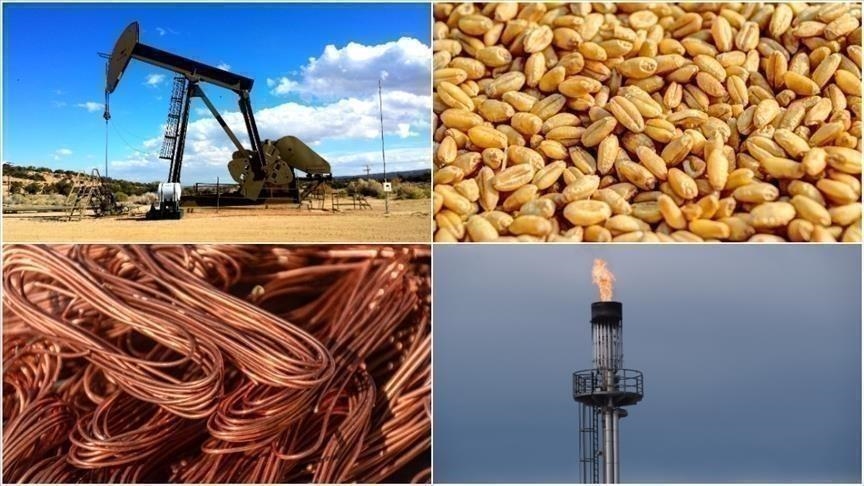ISTANBUL
Commodity markets saw an upward trend last week thanks to positive pricing and supply concerns due to expectations that the Fed may start cutting interest rates in September, as well as the surge in gold prices and the signs of a cooling in the labor market.
Commodity markets soared on supply concerns in precious and base metals, in addition to the agricultural group.
Platinum faces supply deficit risk
The ounce price of gold climbed at its fastest pace in the five-week period as continued signs of cooling in the labor market gave rise to the expectations that the Fed may start cutting rates this year.
Additionally, ongoing geopolitical risks in the Middle East led to silver prices soaring drastically.
The London-based multinational chemicals and tech firm Johnson Matthey said that the platinum market faces the largest supply gap of the decade in 2024, as platinum shipments from Russia return to ordinary levels from last year’s highs, and industrial demand for platinum stays strong.
Given these changes, the ounce price of gold hiked 2.5%, silver 6.1%, palladium 3.2%, and platinum 4.1% last week.
Base metals see mixed course
Copper mines are struggling to meet global demands, thereby pushing copper prices upwards.
Also, copper prices rose as a result of the US-based investment bank Goldman Sachs’ warns of a growing supply stress for copper, as well as the rising expectations for the Fed’s rate cuts.
In light of these developments, the pound price of copper rose 2.5%, zinc 1.2%, and lead 0.9%, while aluminum dropped 1.2%, and nickel 0.6% last week.
The pound price of copper hit a two-year high at $4.74.
As for the energy group, the American Petroleum Institute estimated that the US commercial crude oil stocks would hike by 509,000 barrels in the previous week, against the expectations, which were that the stocks would fall by 1.4 million barrels.
The US Energy Information Administration (EIA) revised its oil price forecast for 2024 and next year downwards.
The EIA’s March report said the barrel price of Brent crude oil, which hiked by $5 in April compared to the previous month and stayed at an average of $90, recorded its fourth consecutive increase as a result of the decline in global oil stocks and geopolitical tensions.
Natural gas prices rose on declining production and growing demand for liquefied natural gas (LNG) and the use of natural gas in LNG plants increased as the Freeport LNG plant in Texas returned to operation.
In view of these changes, the barrel price of Brent crude oil fell 0.2%, while the natural gas traded on the New York Mercantile Exchange in British thermal units (MMBtu) soared 5.1%.
Agricultural group on upward trend as climate events cause prices of wheat, and corn to rise
Wheat and corn prices were affected by frosts in Russia, flooding in Brazil, rainfall in the US corn belt, and locusts in Argentina, which spread a harmful bacterium that hinders growth and loosens corn kernels.
Soybean prices rose on claims that soybean oil in China could be included in the list of tariffs expected to be announced by the US.
Considering this news, the bushel price of wheat traded on the Chicago Mercantile Exchange rose 6.3%, corn 2.1%, soybeans 0.3%, and rice 2.7% last week.
The bushel price of wheat hit a nine-month high of $6.6525, and the bushel price of corn hit a five-month high of $4.72.
Cocoa prices fluctuate sharply
The decline in world cotton production forecasts led to an increase in cotton prices, while coffee prices rose on growing concerns over its production, as well as its increased demand.
Cocoa prices fell sharply the previous week after reaching an all-time high in April, as some investors were forced to close their positions due to the rapid price increase.
Recent rainfall in West Africa alleviated concerns over the next cocoa harvest, however, farmers in the region are still suffering the effects of unfavorable conditions caused by recent heat waves.
The meager cocoa harvest failed to meet the global demand and the many cocoa warehouses worldwide appear emptier than they have been in years.
In light of these changes, the pound price of cotton traded on the Intercontinental Exchange rose 0.7%, coffee 0.2%, and cocoa 9.2%, while sugar fell 0.1% last week.

